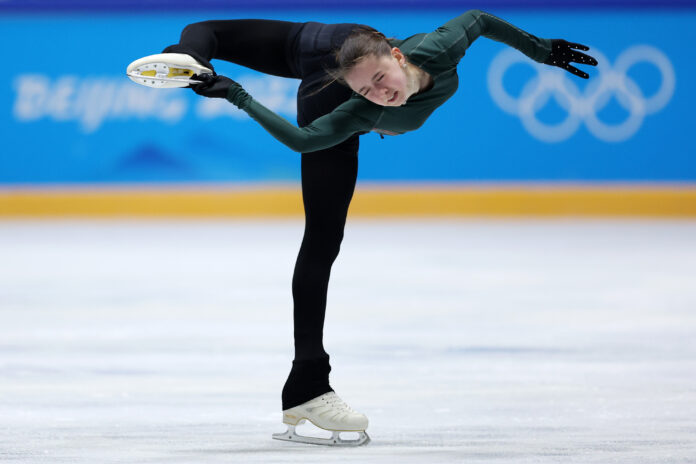Sport’s highest court on Monday cleared 15-year-old Russian figure skater Kamila Valieva to compete in her next Olympic event, but the teenager’s doping charge that has rocked the Beijing Games remained unresolved.
The Court of Arbitration for Sport (CAS) said in a statement on its website that it had upheld an earlier decision by the Russian Anti-Doping Agency (RUSADA) to lift a ban on Valieva.
The skating prodigy took to the Beijing ice half an hour after the CAS ruling, executing a flawless run through of the short program she will skate in Tuesday’s women’s singles.
“Let’s go Kamila!” Russian ice dancer Nikita Katsalapov said at the adjacent Capital Indoor Stadium after winning a silver medal and learning about the decision.
Read more:
Olympic officials suggest Russian skater’s entourage should be probed for failed drug test
CAS cited the fact that Valieva was a “protected person” under World Anti-Doping Agency (WADA) rules as one of the “exceptional circumstances” underpinning its decision.
Preventing Valieva from competing at the Olympics would have caused the teenager irreparable harm, CAS said in its ruling.
The figure skater is one of the youngest athletes to face a doping charge during an Olympics, prompting global outrage at the role of the adults around her, and the continuing scourge of Russian doping in international sports.
“This appears to be another chapter in the systematic and pervasive disregard for clean sport by Russia,” United States Olympic & Paralympic Committee (USOPC) CEO Sarah Hirshland said in a statement released after the decision.
The CAS ruling did not address the merits of Valieva’s drug case. That now sits in the hands of WADA, which has not given a timeline for adjudicating her case. Many fear it will not be resolved by the end of the Games.
WADA did not respond to Reuters emails.
“Only time will tell if she (Valieva) should be competing in these Games and whether or not all of her results will be disqualified,” U.S. Anti-Doping Agency CEO Travis Tygart said.
Trending Stories
Four arrested as blockade of key B.C. border crossing stretches into second day: RCMP
Trucker convoy: 2 members of counter-terrorism unit under probe for alleged involvement
Earlier, IOC spokesman Mark Adams said the awarding of medals for the team event cannot go ahead until the doping case is addressed.
Read more:
Beijing Olympics – Russian skater’s failed drug test confirmed, setting up fight with IOC
It is not clear whether other members of the Russian Olympic Committee (ROC) team can receive gold medals. The second-placed U.S. and Japan in third are also waiting in the wings. Canada finished fourth.
“That will probably not be sorted out during this Games and that is something regrettable, but we have to follow the process,” Adams said.
Tricia Smith, president of the Canadian Olympic Committee (COC), said in a statement the situation that has unfolded is “extremely unfortunate and sad for the athletes.”
“We appreciate that the IOC/ITA, WADA and the ISU each appealed to the Court of Arbitration for Sport’s (CAS) ad hoc division at the Beijing 2022 Games to request that the provisional suspension of the Russian athlete, which was lifted by RUSADA only a day after it was initially imposed, be reinstated,” Smith said.
“While the COC was not permitted to be formally involved in the CAS appeal process, we have been following the details of the case closely and doing what we can to ensure the protection of the interests of Canadian figure skating athletes and all clean athletes. While we trust that the CAS decision was the result of a fair process, we are extremely disappointed with this result.”
The women’s singles start with the short program on Tuesday and conclude on Thursday with the free skating.
It was not clear if Valieva finished in the top three whether that medal ceremony would also go ahead by the end of the Games.
Valieva tested positive for the banned heart medication Trimetazidine on Dec. 25 at the Russian National Championships, but the result was not revealed until Feb. 8 after she competed in the team event at the Winter Games, dazzling the world with the first quad jumps ever completed in the women’s Olympic competition.
CAS emphasized the “serious issues of untimely notification of the results” in its decision.
“Such late notification was not her fault, in the middle of the Olympic Winter Games,” the ruling said.
Read more:
Beijing Olympics – Russian medallist returns to training after reported positive drug test
Tygart said it was another case of Russia not following the rules.
“In addition to athletes and the public, this young athlete has been terribly let down by the Russians and the global anti-doping system that unfairly cast her into this chaos,” he said.
Twice Olympic figure skater Johnny Weir was one of several athletes who took to social media to disagree with the decision to let Valieva’s Games go on.
Former Olympic champion Tara Lipinski posted on Twitter: “At the end of the day, there was a positive test and there is no question in my mind that she should not be allowed to compete.
“Regardless of age or timing of the test/results. I believe this will leave a permanent scar on our sport.”
© 2022 Reuters



